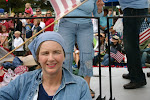Vintage Music Review: Big Country
This is a revised and updated review of one that originally ran in Music Connection, Sept. 29-Oct. 12, 1986. After Stuart Adamson joined the list of rock legends who died too soon when he committed suicide in 2001, his legendary rock band has become inactive save for a few reunion events. However, currently a revised and updated version is touring Europe, with original members Bruce Watson and Mark Brzenzicki. Rather than formally replace Adamson,Mike Peters (formerly of the Alarm) is the new vocalist, while Watson's son Jamie is playing some guitar parts. Derek Forbes replaces bassist Tony Butler, who retired in 2007. See http://www.bigcountry.co.uk/ for the band's official site.
Remember how Big Country were the latest guitar gods to surmount the rock pinnacle in 1983, a Band That Matters artistically, commercially and culturally? Then they were unfairly compared to U2, and their rock stock has been suspect ever since. It shouldn't be, because Big Country and U2 are actually complete opposites, even if they do come from roughly the same part of the world and share some musical and cultural attributes. U2's music is thin and airy, high-flying like a stealth plane. Big Country is the sound of the robust untamed free-spirit outdoors. Now that's been settled, let's just enjoy the greatness of Big Country on their own merits.
At the Palladium to support The Seer, the best demonstration of Big Country's appeal is how Stuart Adamson and his biracial band of Scotsmen kept the mosh pit going for nearly two hours. They hit the right opening note with "Wonderland," followed it with hits like "Fields of Fire" and "Bury Me Where the Rose is Sown" and kept going through a generous sampling of songs spanning all their albums, the crowd often singing along with no urging needed.
They're not dance, they're not punk, but they can sure play an irresistible beat. Over drummer Mark Brzenzicki's hall-filling beat go two guitars turning out Scottish-flavored melodies. Adamson's ability to get a bagpipe sound out a guitar is unique and may never be adequately replicated. Over that goes frontman Adamson's vocals, spitting out a contemporary spin on lyrics that carry a poetic Scottish flavor. Adamson doesn't just sing, he belts and shouts, and then calls out even more power to hit critical notes at critical moments. By comparison U2 frontman Bono's vocals are like a thick Irish mist blanketing a green, while Adamson's are like a storm battering a rough Scottish coastline.
"Just one more song and that's it," was how Adamson introduced "The Teacher," new material from The Seer. Except that wasn't the last song. The evening climaxed with the next song, "In a Big Country" as Adamson lept between stage and barricade to press flesh with some pressed flesh. That must have been a warm-up to an encore, because there was a bigger musical storm still coming, and it was two of Big Country's best at last: "Inwards" and "Harvest Home."
One more encore? This was a Springsteen-like encore, one that on its own runs the length of an entire show. After "One Great Thing" from The Seer and "The Storm" from The Crossing, Adamson asked, "Why stop when we're having fun?" They did another of their original numbers, "Lost Patrol," and then their usual encore cover, "Tracks of My Tears." It's such a complete change of pace that it aptly demonstrates their range--and then they further demonstrated their range with a more unexpected cover choice, "Honky Tonk Women." After one last song, a reprise of "Fields of Fire," at long last the sweaty swarming mob in the mosh pit could become disentangled, take a breath of stuffy Palladium air, and stagger off to whatever after-concert refreshment they had in mind.
When Big Country finds their biggest success, it's in their ability to carry their audience along with every note. The volume may be loud, the dry ice thick and stuffy, the stage lights may have a harsh glare, but none of that matters as the audience becomes subjugated to the sound of the music. Big Country isn't just a contender for the highest pinnacle in rock, they've found their own unique pinnacle in rock. It's time they were rediscovered as one of the ten greatest rock bands of the eighties, and possibly of all time.

